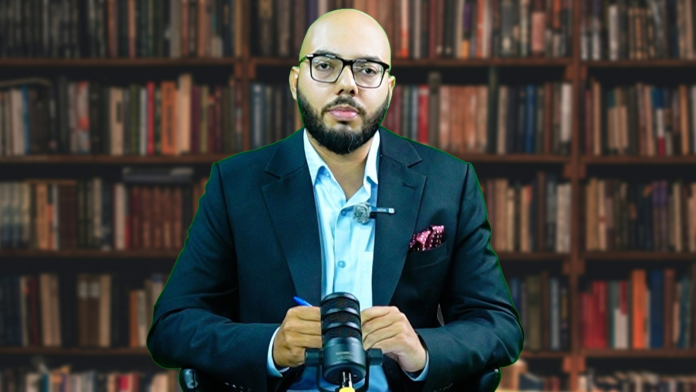Mohammad Daniyal Pervaiz
Journalist, Digital Media House, Vision Point.
It has been observed in the global politics that moral principles have always been regarded high and the states have boasted about how they’re the champions and torch bearer of democracy, human rights, peace and territorial sovereignity but in reality these priniciples are bent, twisted or even broken, just to serve their purpose when they are in the middle of the conflict or when it collides with their national interests. This is where the politics of convenience may come into play, the potential of states to quickly drift away from their narratives, policies, morality and even alliances in global political arena is astonishing.
However, this phenomena is not new to the international affairs but recent incidents in South Asia and Middle East are evident examples of it.
Recently, India has been a victim of this, always blowing one’s own trumpet about its strategic partnership with USA and other Western Powers but what we saw during the recent Pakistan-India conflict was totally a shift of policy by its dear friend ‘Donald Trump’. India had mistaken that the partnership must have come with the unconditional backing by the western allies but USA asked both the parties to show restraint and it was then, the Delhi was taken a back and wanted more from the western ally. USA on the other hand, realised the sensitivity of the matter, as the region is a nuclear flashpoint and could not support India’s claims after Pakistan had shot down 6 of their aircrfats, which was actually given to the Indian government for deterrence to contain chinese hegemony in the region, it was then in the best interest of the United States to come out globally as a mediator between the two nuclear powers rather than showing solidarity to India. This, right here, illustrates how America was conscious of its global image and at that time what best suited USA was to conveniently shift its policy of being a mediator.
Talking about a conflict, I must say that 2025 has been so far a happening year for global affairs, in recent months people of Lebanon could see Missiles either going towards Iran or coming towards Israel, both the states were caught in a tense military situation. But what was a surprising development in all of this was how people within you backstab for political and financial gains. Tel Aviv carried out precise attacks in Tehran, killing some of Its key military and political figures. Iran accused Israel of alleged espionage by hiring some Afghan nationals for this task. Now here’s the twist, Iran had hosted largest afghan refugees, almost 3.5 million, for the longest time, providing them with jobs, shelter, food and above all, dignity. Yet, as a vulnerable commun ity, which is to be easily manipulated by the hands of Mossad, Afghan nationals were bought against the very state that had given shelter. This undermines the basic principal of morality upheld by states that how marginalised and displaced communities are used by Israel’s spy agency as a tool to inflict damage to the opposition and as far as the Afghan nationals living in Iran are concerned, the loyalty and gratitude is burried under the debris of money and survival.
Maneuver according to the situation could be perhaps best interpreted by the American condemnation of Israel hitting targets in Doha, Qatar. On one hand, Qatar hosts one of the largest military bases of the US in the region and on the other hand, Israel is the greatest ally in the region. Both the states had a rough past week, as Israel, doing what it does the best, bombing soverein states and clearly violating UN Charter and Security Council resolutions but what seemed to be interesting was how USA responded. It did condemn the attack and at the same time, it made it clear that this was necessary, hence, it satisfied nobody but navigated through the situation by choosing diplomatic words as Washington could not afford to abandon Doha and upset Tel Aviv by taking sides of either one of them.
The Attack on Doha had a regional condemnation by all Arab and Islamic States, including Pakistan, which is an enemy of the friend of Israel, India – most important player when it comes to trade with Middle Eastern countries. The circumstances had a shift of 360 degrees when Saudi Arabia signed a Strategic Mutual Defense Agreement with Pakistan which cataegorically stated “An act of aggression on either of the countries would be considered as an act of aggression against both”. Saudi Arabia, expected more from USA after the Qatar attack, thought the best possible option to protect its territorial sovereignity is to bring itself under Pakistan’s nuclear umbrella to create deterrence against Israel’s designes to expands its territory in the region under the ‘Greater Israel’ campaign. Therefore, conveniently putting its interest first and totally ignoring the fact that Pakistan’s arch rival, India, is their one of the biggest trading partners.
Political and strategic analysts have studied states behavior since ages and they have come to a conclusion that states are rational actors, they act and pursue to achieve national interests, take advantage of any given oppurtunity to survive in the global poltical landscape. Realism, the school of thought of International Relations is what triggers them, morality is subjugated by the state’s interests, the quest for power politics is what they desire. However, there are no free lunches and everything comes with a cost and while states indulge in politics of convenience, their honesty and trustworthiness is questioned and their credibility is seen with the lens of skepticism.

















